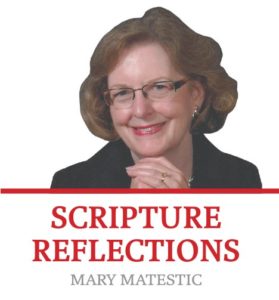Scripture Readings, Sept. 11, 2022
September 11, 2022
24th Sunday in Ordinary Time
Exodus 32:7-11, 13-14
Psalm 51: 3-4; 12-13, 17, 19
1 Timothy 1:12-17
Luke 15:1-10
The witness to God’s mercy through the story of the Prodigal Son makes me think of the challenges of family life. When I read the story, I am forever struck by the vigilance of the father, not to mention his unconditional love for his sons. Let’s face it, family life is messy. I have four married children and they have children. When they come home, I respect each family system as they have evolved. They may not do dishes like me. They may discipline their kiddos differently than I would. They may work more than play or play more than work. Yet, these family systems thrive, I am sure, because the woven thread of love runs through their lives. Their challenges are duked out in the context of their marriage bond and their desire to see their children thrive.
The power of the parable of the Prodigal Son is really about a family system that is about to radically change. The younger son comes to his father to ask for his share of the inheritance. He is impatient with his father’s aging. Therefore, the young son wants to hasten his own life along. It is a selfish act since the father is still alive, and would need the money to live on and grow old with. According to the law, the younger son would only receive one-third of the inheritance, with the oldest son receiving the rest. That’s not the issue really; the real issue is the entitlement bound up with the request. The young son has nothing to start with; he is dependent upon his father’s wealth rather than upon working to save his own money.
But the father obliges him. Sometimes parents must cut the string so their children can learn what life is about, and this father did just that. The boy left his home to “see the big world.” Monetary dissipation and an empty stomach changed his course. So, he went to work for a pig farmer feeding swine. It is here in this place of humility and poverty that Jesus says the boy came to his senses. He became aware of his own reality and decided to go home.
What does it mean to “come to our senses?” It involves the grace of deep personal insight and a fundamental realization that “I must change.” People who have faced down their addictions to crawl out from their own muddied existence have known the grace of coming to their senses.
I read about a man, married with four daughters, who always wanted to be a professional hockey player. Well into his 40s, he hung on to the dream that he had far outlived. His unrealized dream left him depressed, not able to see what he had. One day while listening to his daughter read at Mass on the Solemnity of the Ascension of the Lord, he came to his senses. He realized that like Jesus, who left the earth for the mission to continue, this dad had to let his dream ascend in order to be a better dad. He ultimately embraced his reality and found peace.
Like the prodigal son, when we come to our senses, we come home. Our perspective changes, and the home to which we return is the heart of God, represented by the father in the parable. In the spiritual life, I think we can become smug and overly confident in the mercy of God, which leads to presumption. In that kind of a mindset there is little hope for metanoia, for one presumes they have already arrived. The temptation is to give up on prayer, on the faith community that sustains spiritual growth and to give up on trying. “God will understand in the end and allow me in the pearly gates.” In the Book of Revelation, the author warns us to be either hot or cold, for the lukewarm God will spit out of his mouth. The good thing about the young son in the parable is that his heart was cold, turned away from his father, leaving the familiar and the loving, departing from the very thing that held him. Ironically, the son’s cold heart became fertile ground for his inner awakening to come home.
I don’t hold out that much hope for his brother. The good son, the faithful son, the resentful son, the son who had no forgiveness in his heart, but only vapid jealousy. The monotony of his “goodness” soured his personality. Waking up to his brother’s conversion would disrupt his own presuppositions about who is worthy and who is not.
His brother was dead and had come to life.
Somewhere down the road, the two brothers will meet under the same roof. The lost one awakened, the good son deadened. In the spiritual life, the question becomes, which are we?
However we answer that question, we trust the father is there waiting for us, hoping we have come to our senses.

